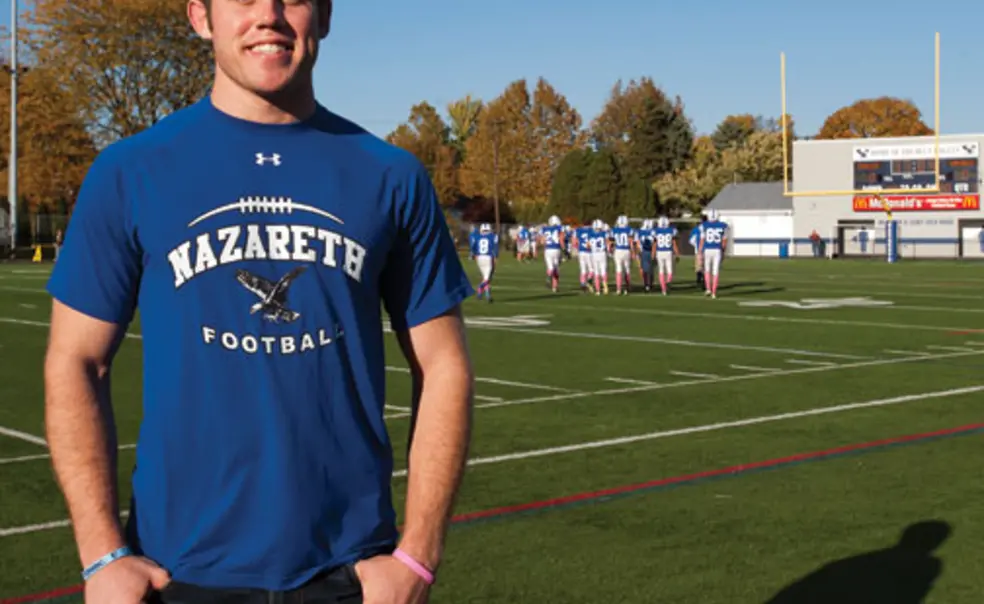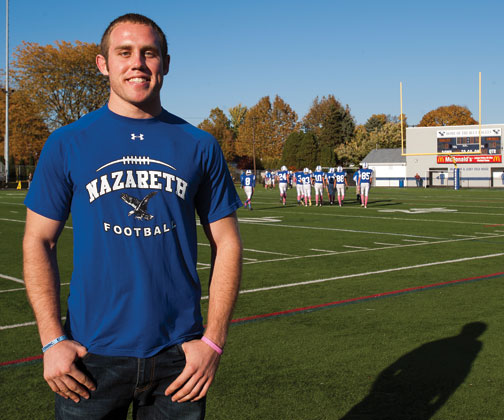For Dibilio, comeback story starts in the classroom
For a Princeton student, writing three grammatically correct sentences should be easy. For Chuck Dibilio ’16, that task seemed monumental.
“In the beginning, it was horrible,” Dibilio said in September, recalling his first speech-therapy session soon after he suffered a life-threatening stroke. Dibilio, then a freshman on the Princeton football team, had been studying for a calculus exam with friends late on a January evening when his speech became slurred. He was taken to the emergency room in Princeton, and later flown to Thomas Jefferson University Hospital in Philadelphia, where surgeons removed a blood clot from an artery in his brain.
After a week in the hospital, Dibilio was back to normal physically, but his cognition and speech remained impaired. He returned home and began going to therapy several times a week, working on exercises to regain and sharpen his cognitive skills. Periodic tests by his therapists charted a steady recovery, and Dibilio’s parents soon noticed that the small deficits in his speech were disappearing. The few things that lingered, such as forgetting what a word meant, became more manageable.
Dibilio’s story made headlines largely because he was an All-Ivy running back, the first Princeton freshman to gain more than 1,000 yards. His case left doctors wondering what could cause a stroke in an otherwise healthy 19-year-old. Despite visits to several experts, that question remains unanswered, Dibilio said.
By the end of August, Dibilio was back in a college classroom, taking a literature course at Moravian College, a short drive from his family’s home in Nazareth, Pa. He picked the topic to “fine tune” the language skills he’s recovered in the last nine months. In February, he plans to return to the University full time.
Coach Bob Surace ’90, who stays in touch through weekly texts and phone calls, said he has been impressed by Dibilio’s unfailing optimism. “It’s hard to be positive all the time when you don’t know why you’ve had a stroke at such a young age,” Surace said. “But if he’s frustrated, he doesn’t show it.”
In the days and months that followed the stroke, Dibilio received visits from coaches, teammates, and Princeton faculty, along with support from beyond the campus. Tedy Bruschi, the former New England Patriots linebacker who suffered a stroke in 2005 and later returned to play in the NFL, called to share encouragement. William Ledger ’54, a doctor at New York Presbyterian Hospital/Weill Cornell Medical Center (and former football letterman), helped to connect Dibilio with leading specialists.
This fall, Dibilio kept busy as a volunteer coach for his high-school alma mater. Adding football to his daily routine helped him to cope with not being able to play, he said. When the Tigers traveled to Pennsylvania for nonconference games at Lehigh and Lafayette, Dibilio watched from the bleachers. After the Lehigh game, he said it was upsetting to watch his team and not be able to play, but “it would have been worse if I didn’t go.”
Dibilio has high hopes for a return to football in 2013. Since the summer, he has been exercising without restrictions, and his primary physician recently cleared him for full contact. Surace said that the University is committed to putting Dibilio’s health first, and there will be no pressure for him to return to the field.
For the next step of his comeback, Dibilio plans to be cradling a textbook, not a pigskin. “Every day, I’m getting closer to my normal life, to the day when the spring semester starts,” he said.













No responses yet